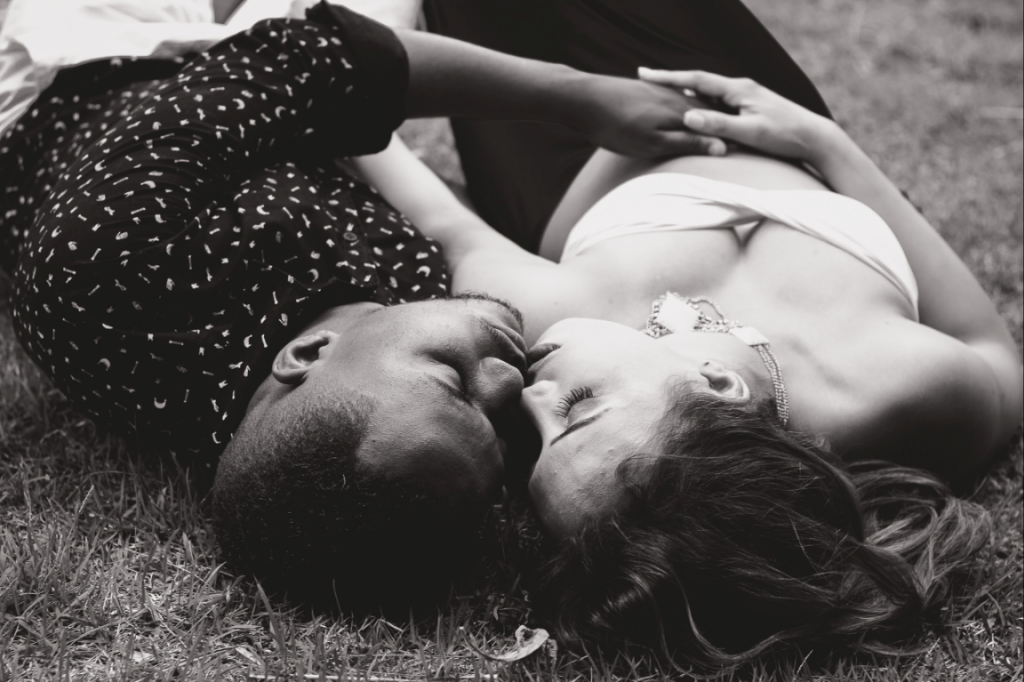The Paradoxes and Myths of Romantic Love

When people talk about romantic love, they tend to paint it as the most glorious thing in the world. In general, they talk about the benefits of having a partner and about how good it is to have someone who loves you and understands you on that level. Of course there are positive effects of love, but it’s important to keep in mind that there are also some negative aspects to it.
The way romantic love is experienced these days can lead you to renounce your other intimate relationships (even if they’re not romantic). You also lose autonomy, independence, and personal freedom. Arguments and jealousy can also arise, or one partner can think that the other one isn’t giving as much to the relationship as they are. All of this can lead to the destruction of the bond between them.
“When two people are under the influence of the most violent, most insane, most delusive, and most transient of passions, they are required to swear that they will remain in that excited, abnormal, and exhausting condition continuously until death do them part.”
-George Bernard Shaw-

The paradoxes of romantic love
Romantic love – at least the way we understand it in our society – is full of paradoxes. The following contradictions can create a considerable amount of tension.
- Desire vs. possession: desire, not just sexual, disappears once it’s been satisfied. In other words, when you have something, it can be enjoyed but not desired. And desire is one of the driving forces behind falling in love. When you encounter obstacles in the pursuit of fulfilling your romantic desire, passion increases, while it decreases if it can be done easily.
- Altruism vs. biological selfishness: socially, we’ve been taught that we have to be altruistic with our partners, so we make sacrifices for the other person and surrender completely to them. This clashes with the evolutionary mechanisms geared towards searching for pleasure and maximizing the probability of genetic transmission. Or in other words, it goes against our instincts.
- Idealization vs. reality: the idealization of the other person is one of the pillars of falling in love, since it’s the origin of your expectations of the relationship and the desire for intimacy. But as the relationship develops, the idealization disappears as you get to know what the other person is really like.
- Passion vs. living together: this is one of the most difficult contradictions, because after living with the same person for a while, the passion you feel gradually decreases. But sociocultural norms tell you that you have to form a stable relationship when you feel passion, and that it should last over time.
- Commitment vs. independence: people want security. We seek commitment, unity, and support, and we want to feel exclusive. But at the same time, we want autonomy and freedom from attachment, so that we can maintain our independence. As you can imagine, balancing both of these needs is a difficult task, and it directly influences the level of satisfaction in the romantic relationship.
- Faithfulness vs. the desire for something new: human beings have impulses that guide us towards new things, even if it’s explicitly prohibited. In other words, we have unfaithful impulses. Over time, we feel attracted to other people, and that clashes directly with the societal norm of sexual exclusivity for the rest of our lives. This rule is entirely cultural, since it doesn’t occur in other species or even in all human societies.
“Neither with you nor without you
do my sorrows have a remedy.
With you, because you kill me,
And without you, because I die.”-Antonio Machado-
The myths of romantic love
In addition to paradoxes, romantic love also comes with a lot of myths. These beliefs come from our culture, and they can be absurd, false, and impossible. They’re difficult to achieve due to biological, psychological, and social factors.

- The myth of the other half: this is the belief that your partner is the only and best choice. They’re you’re soulmate, and you were predestined to be together.
- The exclusivity myth: this is the belief that you can only have romantic feelings for one person at a time.
- The myth of marriage or cohabitation: this is the belief that a romantic relationship should lead to a permanent union.
- The myth of omnipotence: this is the belief that no obstacle can break the relationship, because love can handle anything.
- The myth of durability: this is the belief that the initial passion should last over time, despite living together.
- The fidelity myth: this is the belief that your partner, and only your partner should satisfy all your desires.
- The myth of free will: this is the belief that your romantic feelings are not influenced by sociological, biological, and cultural factors that are outside of your control and awareness.
- The equivalency myth: this is the belief that if you’re not passionately infatuated with your partner anymore, it’s because you don’t love them anymore.
- The partner myth: this is the belief that throughout human history, we’ve always partnered up by nature.
- The jealousy myth: this is the belief that it’s not true love if you don’t feel jealousy.
The truth is that romantic love can produce a bunch of negative effects. These paradoxes and myths can become a part of the relationship and cause problems, ranging from arguments and temporary discomfort to more dramatic and extreme issues.
It’s clear that mutual love can be a pillar of happiness and health. And when your love isn’t reciprocated or you go through a breakup, it can have many harmful consequences. But it’s interesting and important to know and work through both the paradoxes and the myths of romantic love.
Images courtesy of Toa Heftiba, Matheus Ferrero and Clem Onojeghuo
When people talk about romantic love, they tend to paint it as the most glorious thing in the world. In general, they talk about the benefits of having a partner and about how good it is to have someone who loves you and understands you on that level. Of course there are positive effects of love, but it’s important to keep in mind that there are also some negative aspects to it.
The way romantic love is experienced these days can lead you to renounce your other intimate relationships (even if they’re not romantic). You also lose autonomy, independence, and personal freedom. Arguments and jealousy can also arise, or one partner can think that the other one isn’t giving as much to the relationship as they are. All of this can lead to the destruction of the bond between them.
“When two people are under the influence of the most violent, most insane, most delusive, and most transient of passions, they are required to swear that they will remain in that excited, abnormal, and exhausting condition continuously until death do them part.”
-George Bernard Shaw-

The paradoxes of romantic love
Romantic love – at least the way we understand it in our society – is full of paradoxes. The following contradictions can create a considerable amount of tension.
- Desire vs. possession: desire, not just sexual, disappears once it’s been satisfied. In other words, when you have something, it can be enjoyed but not desired. And desire is one of the driving forces behind falling in love. When you encounter obstacles in the pursuit of fulfilling your romantic desire, passion increases, while it decreases if it can be done easily.
- Altruism vs. biological selfishness: socially, we’ve been taught that we have to be altruistic with our partners, so we make sacrifices for the other person and surrender completely to them. This clashes with the evolutionary mechanisms geared towards searching for pleasure and maximizing the probability of genetic transmission. Or in other words, it goes against our instincts.
- Idealization vs. reality: the idealization of the other person is one of the pillars of falling in love, since it’s the origin of your expectations of the relationship and the desire for intimacy. But as the relationship develops, the idealization disappears as you get to know what the other person is really like.
- Passion vs. living together: this is one of the most difficult contradictions, because after living with the same person for a while, the passion you feel gradually decreases. But sociocultural norms tell you that you have to form a stable relationship when you feel passion, and that it should last over time.
- Commitment vs. independence: people want security. We seek commitment, unity, and support, and we want to feel exclusive. But at the same time, we want autonomy and freedom from attachment, so that we can maintain our independence. As you can imagine, balancing both of these needs is a difficult task, and it directly influences the level of satisfaction in the romantic relationship.
- Faithfulness vs. the desire for something new: human beings have impulses that guide us towards new things, even if it’s explicitly prohibited. In other words, we have unfaithful impulses. Over time, we feel attracted to other people, and that clashes directly with the societal norm of sexual exclusivity for the rest of our lives. This rule is entirely cultural, since it doesn’t occur in other species or even in all human societies.
“Neither with you nor without you
do my sorrows have a remedy.
With you, because you kill me,
And without you, because I die.”-Antonio Machado-
The myths of romantic love
In addition to paradoxes, romantic love also comes with a lot of myths. These beliefs come from our culture, and they can be absurd, false, and impossible. They’re difficult to achieve due to biological, psychological, and social factors.

- The myth of the other half: this is the belief that your partner is the only and best choice. They’re you’re soulmate, and you were predestined to be together.
- The exclusivity myth: this is the belief that you can only have romantic feelings for one person at a time.
- The myth of marriage or cohabitation: this is the belief that a romantic relationship should lead to a permanent union.
- The myth of omnipotence: this is the belief that no obstacle can break the relationship, because love can handle anything.
- The myth of durability: this is the belief that the initial passion should last over time, despite living together.
- The fidelity myth: this is the belief that your partner, and only your partner should satisfy all your desires.
- The myth of free will: this is the belief that your romantic feelings are not influenced by sociological, biological, and cultural factors that are outside of your control and awareness.
- The equivalency myth: this is the belief that if you’re not passionately infatuated with your partner anymore, it’s because you don’t love them anymore.
- The partner myth: this is the belief that throughout human history, we’ve always partnered up by nature.
- The jealousy myth: this is the belief that it’s not true love if you don’t feel jealousy.
The truth is that romantic love can produce a bunch of negative effects. These paradoxes and myths can become a part of the relationship and cause problems, ranging from arguments and temporary discomfort to more dramatic and extreme issues.
It’s clear that mutual love can be a pillar of happiness and health. And when your love isn’t reciprocated or you go through a breakup, it can have many harmful consequences. But it’s interesting and important to know and work through both the paradoxes and the myths of romantic love.
Images courtesy of Toa Heftiba, Matheus Ferrero and Clem Onojeghuo
This text is provided for informational purposes only and does not replace consultation with a professional. If in doubt, consult your specialist.







